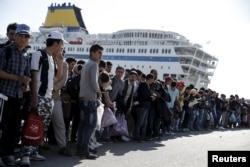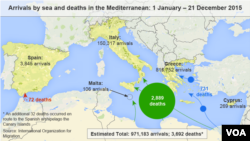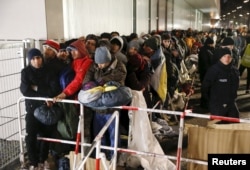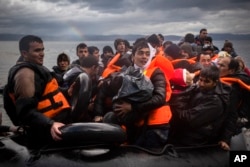The U.N. refugee agency reports an unprecedented one million people, most fleeing persecution and war, have arrived in Europe this year.
The UNHCR says the number of refugees and migrants who have made the dangerous Mediterranean Sea crossing to Europe is nearly five times higher this year than last. In 2014, nearly 220,000 people fled to Europe.
It says more than 3,600 people died this year trying to reach Europe in flimsy smuggler boats.
The International Organization for Migration also issued figures Tuesday showing that 1,005,504 migrants from Africa and the Middle East have crossed into the continent by a combination of irregular land and sea routes.
Tipping point
A spokesman for the IOM, Joel Millman, told VOA that there are several factors for such a great, unforeseen influx, but the biggest is the demographic change in the Middle East.
“The biggest is the change in the composition of the refugees in the Middle East, principally Syria and Iraq — people that were staying in counties like Turkey, Lebanon, Jordan. To some degree a tipping point was reached and it just became much harder for people to remain there for a variety of reasons,” he said.
Refugees from Syria, which has been torn apart by a five-year-old civil war that has left over 200,000 people dead and millions more displaced, account for half of all migrants and refugees, followed by refugees from two other war-torn countries, Afghanistan and Iraq.
Millman said that the migrant wave is unlikely to immediately stop in 2016.
The UNHCR says about 80 percent of the refugees and migrants have crossed the Aegean from Turkey to Greece, which does not have the capacity to accommodate them. Agency spokesman Adrian Edwards tells VOA at least half the arrivals are refugees from Syria.
“Syria, as we all know, is an absolutely catastrophic conflict, which is producing levels of human suffering and displacement really unparalleled anywhere." said Edwards. "We are also seeing people coming from Afghanistan, from Iraq, from some of the countries in the Horn of Africa and so on, where we have large displacement situations. So, there is a significant majority of the people on the move who are refugees or would have a very strong claim at least to international protection.”
Refugees vs. economic migrants
Edwards says people move for a variety of reasons. Many are so-called economic migrants. He says these people too need help and should be properly received. He says their cases should be looked at to see if they have a legitimate claim for refugee status.
If they do not, he says they deserve to be dealt with in a humane manner, according to immigration law. But he notes the mass migration into Europe is primarily a refugee situation, which reflects the sad state of the world.
“Fifteen major conflicts over the past five years, all producing mass displacement," he said. "Many of those conflicts still continuing today, many pre-existing conflicts producing continuing displacement decade upon decade.”
Edwards says nations are not investing enough on measures needed to address the root causes of displacement. He says until solutions are found to stabilize the situation, desperate people will continue to flee from war, persecution, human rights abuse, and poverty in search of a safer, better life.
Isabela Cocoli contributed to this report.








